Germany
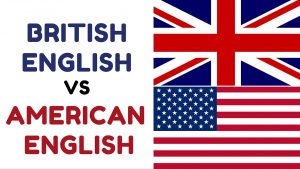 When the colonists left England to form America, they were like the younger sibling, at least when it came to language and much of how they ran the country. Nevertheless, like that younger sibling, things began to change pretty quickly. Part of the change was due simply to distance. When you don’t hear a language all the time, you begin to vary in your own speech. I didn’t really realize there was such a difference between American English and British English, other than the accent of course. Still, I noticed that more and more forms were asking which of the two I spoke. I always thought that it was an odd question, because English is English…right? Well, the correct answer is…wrong!! And when I thought about it, I knew that to be true.
When the colonists left England to form America, they were like the younger sibling, at least when it came to language and much of how they ran the country. Nevertheless, like that younger sibling, things began to change pretty quickly. Part of the change was due simply to distance. When you don’t hear a language all the time, you begin to vary in your own speech. I didn’t really realize there was such a difference between American English and British English, other than the accent of course. Still, I noticed that more and more forms were asking which of the two I spoke. I always thought that it was an odd question, because English is English…right? Well, the correct answer is…wrong!! And when I thought about it, I knew that to be true.
The changes began almost immediately after the first Englishman set foot on American soil. It all started with “Americanisms.” These “Americanisms” have been created or changed from other English terms to produce a language that differs from our forefathers, signifying our uniqueness and independence. I’m sure our founders were rather pleased with themselves with this process, if they realized it at all. By the time of the first United States census, in 1790, there were four million Americans, 90% of whom were descendants of English colonists. When I think of the speed of that growth, it strikes me as phenomenal to say the least. Because of the large English background, there was no question that our official native language would be “English,” but it would not be the same as that spoken in Great Britain. “Americanism” means a word or expression that originated in the United States. The term includes outright coinages and foreign borrowings which first became “English” in the United States, as well as older terms used in new senses first given them in American usage.
In fact, by 1720, the colonists knew that we did not speak the same language as the people in England. The most obvious reason was, of course, the sheer distance from England. Nevertheless, that was not the only  reason. Over the years, many words were borrowed from the Native Americans, as well as other immigrants from France, Germany, Spain, and other countries. We had to communicate with the people around us too, and other words that became obsolete “across the pond,” continued to be utilized in the colonies. In other cases, words simply had to be created in order to explain the unfamiliar landscape, weather, animals, plants, and living conditions that these early pioneers encountered. These things might not have existed in England.
reason. Over the years, many words were borrowed from the Native Americans, as well as other immigrants from France, Germany, Spain, and other countries. We had to communicate with the people around us too, and other words that became obsolete “across the pond,” continued to be utilized in the colonies. In other cases, words simply had to be created in order to explain the unfamiliar landscape, weather, animals, plants, and living conditions that these early pioneers encountered. These things might not have existed in England.
By 1756, the English would make the first “official” reference to the “American dialect.” Samuel Johnson made note of it a year after he published his Dictionary of the English Language. Johnson’s use of the term “American dialect” was not meant to simply explain the differences, but rather, was intended as an insult. It was rather like calling our language the “low class” version of the English language. Remember if you will, that there were those who did not think the United States should ever be a sovereign nation. Years earlier…as early as 1735, the English were calling our language “barbarous,” and referred to our “Americanisms” as barbarisms. The English sneered at our language, something that continued for more than a century after the Revolutionary War, as they laughed and condemned as unnecessary, hundreds of American terms and phrases.
Our newly independent Americans, were proud of their “new” American language, wearing it, as a badge of independence. In 1789, Noah Webster wrote in his Dissertations on the English Language: “The reasons for American English being different than English English are simple: As an independent nation, our honor requires us to have a system of our own, in language as well as government.” Our leaders, including Thomas Jefferson and Benjamin Rush, agreed. It was not only good politics, it was sensible. The feelings of the “rest of the world” didn’t matter. The language changed even more during the western movement as Native American and  Spanish words became a part of our language.
Spanish words became a part of our language.
In 1923, the State of Illinois General Assembly, passed the act stating in part: “The official language of the State of Illinois shall be known hereafter as the “American” language and not as the “English” language.” A similar bill was also introduced in the U.S. House of Representatives the same year but died in committee. Now, after centuries of forming our “own” language, the English and American versions are once again beginning to blend as movies, songs, electronics, and global traveling bring the two “languages” closer together once again.
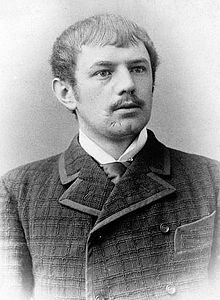 Hitler was undoubtedly one of the most horrible dictators of all time, but what prompted him to become the evil man he was. The story actually begins before Hitler was even born. In 1868, a baby named Dietrich Eckart was born in Neumarkt, Germany, on March 23, the son of a royal notary and law counselor. My guess is that he had a fairly normal childhood…at least until his mother died when he was just ten years old. That may not seem like an event that was unique to Eckart, but somehow it was different, or would become different. Eckart’s life was further complicated when his father died seventeen years later in 1895. At this point, Eckart inherited a considerable sum of money, and started to study medicine in Munich. That would be the last of his somewhat normal life. He spent his father’s money very quickly, and recklessly.
Hitler was undoubtedly one of the most horrible dictators of all time, but what prompted him to become the evil man he was. The story actually begins before Hitler was even born. In 1868, a baby named Dietrich Eckart was born in Neumarkt, Germany, on March 23, the son of a royal notary and law counselor. My guess is that he had a fairly normal childhood…at least until his mother died when he was just ten years old. That may not seem like an event that was unique to Eckart, but somehow it was different, or would become different. Eckart’s life was further complicated when his father died seventeen years later in 1895. At this point, Eckart inherited a considerable sum of money, and started to study medicine in Munich. That would be the last of his somewhat normal life. He spent his father’s money very quickly, and recklessly.
With his money gone, Eckart quit school, and began work as a poet, playwright, and journalist. He moved to Berlin in 1899, where he wrote a number of plays, often with autobiographical traits. Apparently, he was about the only one interested in his plays, because despite becoming the protegé of Graf Georg von Hülsen-Haeseler, the artistic director of the royal theaters, he never was successful as a playwright. Taking his madness one step further, he blamed his failure on society. This was the beginning of the insanity that became Dietrich Eckart. Later on, Eckart developed an ideology of a “genius higher human,” after reading earlier writings by Lanz von Liebenfels. Eckart saw himself like Arthur Schopenhauer and Angelus Silesius, and also became fascinated by Mayan beliefs, but never had much sympathy for the scientific method. That makes sense, because he seemed to want to make up his own truths. Eckart also loved and strongly identified with Henrik Ibsen’s Peer Gynt.
In 1913, when he moved back to Munich, he joined up with Rudolf von Sebottendorff’s right wing Thule Society, and became very politically active. He wrote the nationalist play “Heinrich der Hohenstaufe” (“Heinrich of the High Baptism”), in which he made the claim to world leadership for the German people, craziness that he would eventually pass along to Hitler. Soon he became the editor of the anti-semetic periodical Auf gut Deutsch. Eckart opposed the Treaty of Versailles, which he described as treasonous, and instead spread the so-called Dolchstoßlegende, which stated that the social democrats and Jews were to blame for Germany’s defeat in World War I. He was involved in the founding Deutsche Arbeiterpartei (German Workers’ Party) together with Gottfried Feder and Anton Drexler in 1919, which later on was renamed Nationalsozialistische deutsche Arbeiterpartei (National Socialist German Workers’ Party, NSDAP). He invented and published the NSDAP’s own periodical Völkischer Beobachter, and also wrote the songtext “Deutschland erwache” (Germany awake), which became the anthem of the Nazi party.
Adolf Hitler was born April 20, 1889, just a few years before Eckart’s dad’s passing. During a speech he gave before party members on August 14 1919, Eckart met Adolf Hitler. He exerted considerable influence on Hitler in the following years. Hitler looked at him as his “fatherly friend.” On November 9 1923, Eckart was involved in 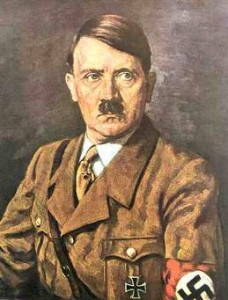 the Nazi party’s failed Beer Hall Putsch,as was Hitler. They were arrested and sent to Landsberg prison along with other party officials, but he was released again soon due to illness. He died of a heart attack caused by a morphine addiction in Berchtesgaden on December 26, 1923. Hitler later dedicated the first volume of Mein Kampf to Eckart, and also named the Waldbühne in Berlin “Dietrich-Eckart-Bühne” when it was first opened for the 1936 Summer Olympics. In 1925, Eckarts unfinished essay, Der Bolschewismus von Moses bis Lenin. Zwiegespräch zwischen Hitler und mir (“Bolshevism from Moses to Lenin. Dialogues between Hitler and me”), was posthumously published, although it has been shown that it the dialogues were an invention. The essay was, in fact, written by Eckart alone. I don’t know what Hitler would have been like had e not met Eckart. My guess is that the evil ideas Hitler had were there before their meeting, but I do believe that Eckart had a great influence on Hitler,and probably helped formulate some of the evil that was to come.
the Nazi party’s failed Beer Hall Putsch,as was Hitler. They were arrested and sent to Landsberg prison along with other party officials, but he was released again soon due to illness. He died of a heart attack caused by a morphine addiction in Berchtesgaden on December 26, 1923. Hitler later dedicated the first volume of Mein Kampf to Eckart, and also named the Waldbühne in Berlin “Dietrich-Eckart-Bühne” when it was first opened for the 1936 Summer Olympics. In 1925, Eckarts unfinished essay, Der Bolschewismus von Moses bis Lenin. Zwiegespräch zwischen Hitler und mir (“Bolshevism from Moses to Lenin. Dialogues between Hitler and me”), was posthumously published, although it has been shown that it the dialogues were an invention. The essay was, in fact, written by Eckart alone. I don’t know what Hitler would have been like had e not met Eckart. My guess is that the evil ideas Hitler had were there before their meeting, but I do believe that Eckart had a great influence on Hitler,and probably helped formulate some of the evil that was to come.
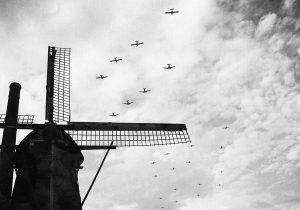 It has been 74 years since 17,740 Americans gave their lives to liberate the people of the Netherlands (often called Holland) from the Germans during World War II, and the people of Holland have never forgotten that sacrifice. For 74 years now, the people of the small village of Margraten, Netherlands have taken care of the graves of the lost at the Margraten American Cemetery. On Memorial Day, they come, every year, bringing Memorial Day bouquets for men and women they never knew, but whose 8,300 headstones the people of the Netherlands have adopted as their own. Of the 17,740 who were originally buried there, 9,440 were later moved to various paces in he United States by their families. “What would cause a nation recovering from losses and trauma of their own to adopt the sons and daughters of another nation?” asked Chotin, the only American descendant to speak on that Sunday 4 years ago. “And what would keep that commitment alive for all of these years, when the memory of that war has begun to fade? It is a unique occurrence in the history of civilization.”
It has been 74 years since 17,740 Americans gave their lives to liberate the people of the Netherlands (often called Holland) from the Germans during World War II, and the people of Holland have never forgotten that sacrifice. For 74 years now, the people of the small village of Margraten, Netherlands have taken care of the graves of the lost at the Margraten American Cemetery. On Memorial Day, they come, every year, bringing Memorial Day bouquets for men and women they never knew, but whose 8,300 headstones the people of the Netherlands have adopted as their own. Of the 17,740 who were originally buried there, 9,440 were later moved to various paces in he United States by their families. “What would cause a nation recovering from losses and trauma of their own to adopt the sons and daughters of another nation?” asked Chotin, the only American descendant to speak on that Sunday 4 years ago. “And what would keep that commitment alive for all of these years, when the memory of that war has begun to fade? It is a unique occurrence in the history of civilization.”
The people of Margraten immediately embraced the Americans, who had come to their aid when they needed it most. The town’s mayor invited the company’s commanders to sleep in his home, while the enlisted men slept in the schools. The protection against rain and buzz bombs was welcomed. Later, villagers hosted U.S. troops when the men were given rest-and-recuperation breaks from trying to breach the German frontier defenses, known as the Siegfried Line. “After four dark years of occupation, suddenly [the Dutch] people were free from the Nazis, and they could go back to their normal lives and enjoy all the freedoms they were used to. They knew they had to thank the American allies for that,” explained Frenk Lahaye, an associate at the cemetery.
By November 1944, two months after the village’s 1,500 residents had been freed from Nazi occupation by the U.S. 30th Infantry Division the town’s people were filled with gratitude, but the war wasn’t over. In late 1944  and early 1945, thousands of American soldiers would be killed in nearby battles trying to pierce the German defense lines. The area was filled with Booby-traps and heavy artillery fire. All that combined with a ferocious winter, dealt major setbacks to the Allies, who had already suffered losses trying to capture strategic Dutch bridges crossing into Germany during the ill-fated Operation Market Garden.
and early 1945, thousands of American soldiers would be killed in nearby battles trying to pierce the German defense lines. The area was filled with Booby-traps and heavy artillery fire. All that combined with a ferocious winter, dealt major setbacks to the Allies, who had already suffered losses trying to capture strategic Dutch bridges crossing into Germany during the ill-fated Operation Market Garden.
Now, the U.S. military needed a place to bury its fallen. The Americans ultimately picked a fruit orchard just outside Margraten. On the first day of digging, the sight of so many bodies made the men in the 611th Quartermaster Graves Registration Company ill. The bodies arrived in a procession of trucks and trailers. Death hung in the air over the whole village of Margraten. The sight of so much death caused a few of the people helping with the burials to become ill. They suddenly made a break for the latrines. The first burial at Margraten took place on November 10, 1944. Laid to rest in Plot A, Row 1, Grave 1: John David Singer Jr, a 25-year-old infantryman, whose remains would later be repatriated and buried in Denton, Maryland, about 72 miles east of Washington. Between late 1944 and spring 1945, up to 500 bodies arrived each day, so many that the mayor went door to door asking villagers for help with the digging. Over the next two years, about 17,740 American soldiers would be buried here, though the number of graves would shrink as thousands of families asked for their loved ones’ remains to be sent home, until 8,300 remained, and still, the graves are cared for by the town’s people, as if the dead were their own loved one. Not only that, but they have taken it upon themselves to research the deceased, and learn of their lives as a way of showing honor to these fallen heroes.
On May 29, 1945, the day before the cemetery’s first Memorial Day commemoration, 20 trucks from the 611th 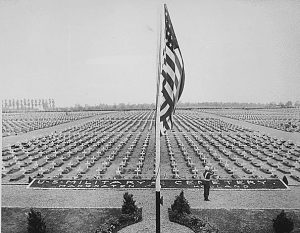 collected flowers from 60 different Dutch villages. Nearly 200 Dutch men, women and children spent all night arranging flowers and wreaths by the dirt-covered graves, which bore makeshift wooden crosses and Stars of David. By 8am, the road leading into Margraten was jammed with Dutch people coming on foot, bicycle, carriages, horseback and by car. Silent film footage shot that day shows some of the men wearing top hats as they carried wreaths. A nun and two young girls laid flowers at a grave, then prayed. Solemn-faced children watched as cannons blasted salutes. The Dutch, Shomon wrote, “were perceptibly stirred, wept in bowed reverence.” All they do for these heroes is because they have vowed never to forget.
collected flowers from 60 different Dutch villages. Nearly 200 Dutch men, women and children spent all night arranging flowers and wreaths by the dirt-covered graves, which bore makeshift wooden crosses and Stars of David. By 8am, the road leading into Margraten was jammed with Dutch people coming on foot, bicycle, carriages, horseback and by car. Silent film footage shot that day shows some of the men wearing top hats as they carried wreaths. A nun and two young girls laid flowers at a grave, then prayed. Solemn-faced children watched as cannons blasted salutes. The Dutch, Shomon wrote, “were perceptibly stirred, wept in bowed reverence.” All they do for these heroes is because they have vowed never to forget.
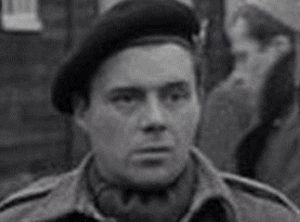 The term “coward” doesn’t normally bring with it thoughts of bravery in the face of danger, but perhaps it should…sometimes anyway. Charles Joseph Coward was born in Britain on January 30, 1905. I can’t say what his young life was like, and perhaps it was his parents who taught him to prove his name wrong, but I’m quite sure they were proud of just how well he proved that he was anything, but a coward. Coward joined the British Army in 1937 and served with the 8th Reserve Regimental Royal Artillery. By the time WWII started in 1939, he was a Quartermaster Battery Sergeant Major. They already saw something in him that disproved his name.
The term “coward” doesn’t normally bring with it thoughts of bravery in the face of danger, but perhaps it should…sometimes anyway. Charles Joseph Coward was born in Britain on January 30, 1905. I can’t say what his young life was like, and perhaps it was his parents who taught him to prove his name wrong, but I’m quite sure they were proud of just how well he proved that he was anything, but a coward. Coward joined the British Army in 1937 and served with the 8th Reserve Regimental Royal Artillery. By the time WWII started in 1939, he was a Quartermaster Battery Sergeant Major. They already saw something in him that disproved his name.
In World War II, Coward was fighting against the Nazis when the Germans assaulted the port of Calais on May 21, 1940, marking the start of the Siege of Calais. The German army drove the Allies back, and the British Expeditionary Force fled from France through the port of Dunkirk. Fortunately, most made it out in time…to fight the Germans another day. Unfortunately for Coward, he was not one of them, and he became a POW. He did have an advantage, however, in that he spoke German. He used his language skills to make seven escape attempts by passing himself off as a German soldier. One of the escape attempts worked. He was free, but he was injured, and was sent to a German Army field hospital. Coward kept up his German soldier act. After the German doctors had treated his wounds, he was awarded an Iron Cross for his bravery and suffering. Unfortunately, they realized their mistake pretty quickly. Coward was sent back to the POW camp where he earned a reputation for sabotage while on work details. Finally, he was sent to Poland…Auschwitz, to be precise…not to the death camp part of Auschwitz, but rather to the work camp part of it. Coward arrived at Auschwitz III (Monowitz), which was the working camp, in December 1943. The camp was located approximately five miles from Auschwitz II (Birkenau), which was the death camp. There he became a modern day “Hogan’s Hero,” although there was nothing funny about his situation, like there was in the television show. Coward spied on his captors and risked his life to save those he could. All that under the name of Coward.
IG Farben was a German chemical and pharmaceutical industry conglomerate. Its name was taken from Interessen-Gemeinschaft Farbenindustrie. IG Farben had acquired the patent to Zyklon B. It was originally used as an insecticide and by US immigration officials to delouse Mexican laborers. The Nazis had a different use for it…the extermination of Jews and other undesirables. Coward and between 1,200 and 1,400 other British POWs were kept at sub-camp E715. Their job was to run the liquid fuel plant which produced synthetic rubber. Coward, due to his German language skills worked as a Red Cross liaison officer, because Germany was still keeping up the pretense of honoring the Geneva Convention articles. He was allowed some measure of free movement within the camp, and even permitted to go to the nearby towns. In town, Coward saw trainloads of Jews arriving at the the extermination camp. Auschwitz III housed 10,000 Jews who were “allowed” to work. They were worked to the point of exhaustion and sickness. Given the brutality and deliberate starvation they did not last long. Coward simply couldn’t stand by and do nothing. The British POWs had access to Red Cross items, so Coward and the other prisoners set aside food and medicine to be smuggled to the Jewish section of their camp, to help as many as possible. Coward was allowed to send letters out, so he began writing to his friend…Mr. William Orange, a fictitious person. It was actually the code for the British War Office. In those letters, he explained what was happening in the camps, as well as the treatment and mass slaughter of Jews. One day, a letter was smuggled to him, asking for help. It came from Karel Sperber, a British ship’s doctor, but there was a problem…Sperber was being held in the Jewish section of Monowitz. So Coward exchanged clothes with an inmate and smuggled himself into the Jewish sector to try to find the doctor. Sadly, he failed, but he did see how Jews in the work camp were being treated. After the war, he was among those who testified at the IG Farben Trial in Nuremberg. He helped to have some of the company’s directors imprisoned, although only for a few years.
He wanted to help the Jews, but to pull it off, he needed two things…chocolate and corpses. It was a daring plan, but it worked. Coward gave the chocolate to the guards in exchange for the bodies of non-Jewish dead prisoners. Then, once their clothes and papers had been removed they were cremated. Jewish escapees put on the clothes and assumed the new, non-Jewish identities. With help from members of the Polish resistance, they were then smuggled out of the camp. As the number of those missing tallied with the number of those who were reported dead, neither Coward nor the bribed guards fell under any suspicion. It is estimated around 400 
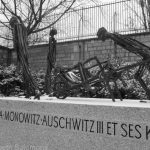 Jews were saved using Coward’s method. In January 1945 Soviet forces advanced deeper into Poland. As they made their way toward Auschwitz, Coward and the other POWs were forced to march to Bavaria in Germany. The prisoners were liberated by Allied forces en route, finally putting an end to the brutal nightmare. In 1963 Yad Vashem recognized Coward as one of the Righteous Among the Nations. He became known as the “Count of Auschwitz.” and a film was made of his exploits called “The Password is Courage.” I think he was a pretty brave man…for a Coward.
Jews were saved using Coward’s method. In January 1945 Soviet forces advanced deeper into Poland. As they made their way toward Auschwitz, Coward and the other POWs were forced to march to Bavaria in Germany. The prisoners were liberated by Allied forces en route, finally putting an end to the brutal nightmare. In 1963 Yad Vashem recognized Coward as one of the Righteous Among the Nations. He became known as the “Count of Auschwitz.” and a film was made of his exploits called “The Password is Courage.” I think he was a pretty brave man…for a Coward.
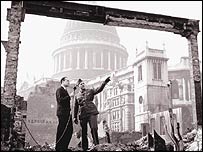 In March or 1941, the United States was largely considered neutral, so we could provide the countries, who were fighting Adolf Hitler, with war material. It was during this period of time, that the United Kingdom, an old enemy of the United States, since the United States fought against them for our independence, needed our help. Of course, we were allies by that time, and so the thought of a loan to the UK was not out o the question. The UK had been fighting against Adolf Hitler’s Germany army for a while by then, and funds were dwindling. The US loaned $4.33 billion to Britain in 1945, while Canada loaned US$1.19 billion in 1946, at a rate of 2% annual interest. It was a good deal, but in the end, the amount paid back was nearly double the amounts loaned in 1945 and 1946.
In March or 1941, the United States was largely considered neutral, so we could provide the countries, who were fighting Adolf Hitler, with war material. It was during this period of time, that the United Kingdom, an old enemy of the United States, since the United States fought against them for our independence, needed our help. Of course, we were allies by that time, and so the thought of a loan to the UK was not out o the question. The UK had been fighting against Adolf Hitler’s Germany army for a while by then, and funds were dwindling. The US loaned $4.33 billion to Britain in 1945, while Canada loaned US$1.19 billion in 1946, at a rate of 2% annual interest. It was a good deal, but in the end, the amount paid back was nearly double the amounts loaned in 1945 and 1946.
The United States was pulled into World War II shortly after, when Japan attacked Pearl Harbor. That marked to end of the program to provide military materials, because the United States was no longer considered neutral. At this point, the United States was very much needed in a very different way, and could not be neutral and be an effective help, but they also had a score to settle, and it could not be handled on the sidelines. The United States had hoped to sit this one out, but that was not to be. The Axis of Evil was winning against the Allied Nations, and they needed help, but it was the boldness of the attack on Pearl Harbor that finally awoke the sleeping giant that was the United States. The United States victory over Japan in the Battle of Midway was the turning point of the war in the Pacific. Then Germany invaded the Soviet Union. The Soviet Union defeated Germany at Stalingrad, marking the turning point of the war in Eastern Europe. As we all know, in the end the Allies were victorious in World War II.
There are still World War I debts owed to and by Britain. Since a moratorium on all debts from that conflict was agreed at the height of the Great Depression, no repayments have been made to or received from other nations since 1934. Despite the favorable rates there were six years in which Britain deferred payment because of economic or political crises. Britain settled its World War II debts to the United States and Canada when it paid the final 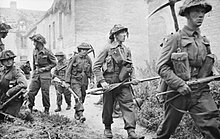 two installments in 2006. The payments of $83.25 million to the US and US$22.7 million to Canada are the last of 50 installments since 1950. Upon the final payments, the UK will have paid back a total of $7.5 billion to the US and US$2 billion to Canada. “This week we finally honor in full our commitments to the United States and Canada for the support they gave us 60 years ago,” said Treasury Minister Ed Balls at the time of those final payments. “It was vital support which helped Britain defeat Nazi Germany and secure peace and prosperity in the post-war period. We honor our commitments to them now as they honored their commitments to us all those years ago,” he added.
two installments in 2006. The payments of $83.25 million to the US and US$22.7 million to Canada are the last of 50 installments since 1950. Upon the final payments, the UK will have paid back a total of $7.5 billion to the US and US$2 billion to Canada. “This week we finally honor in full our commitments to the United States and Canada for the support they gave us 60 years ago,” said Treasury Minister Ed Balls at the time of those final payments. “It was vital support which helped Britain defeat Nazi Germany and secure peace and prosperity in the post-war period. We honor our commitments to them now as they honored their commitments to us all those years ago,” he added.
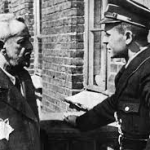
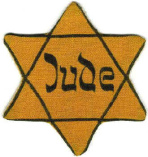 Over the centuries, people have gone to great lengths to humiliate their enemies. The worst thing for the Jewish people was that over the centuries, there have been so many enemies. To this day, it doesn’t matter that Israel is one of the smallest nations in the world, the Muslim nations don’t even want them to have that small area, and the Muslims weren’t the only enemy of the Jewish people either. The Jews of Europe were legally forced to wear badges or distinguishing garments, like pointed hats, to let everyone know who they were. This practice began at least as far back as the 13th century. It continued throughout the Middle Ages and Renaissance, but was then largely phased out during the 17th and 18th centuries. With the coming of the French Revolution and the emancipation of western European Jews throughout the 19th century, the wearing of Jewish badges was abolished in Western Europe.
Over the centuries, people have gone to great lengths to humiliate their enemies. The worst thing for the Jewish people was that over the centuries, there have been so many enemies. To this day, it doesn’t matter that Israel is one of the smallest nations in the world, the Muslim nations don’t even want them to have that small area, and the Muslims weren’t the only enemy of the Jewish people either. The Jews of Europe were legally forced to wear badges or distinguishing garments, like pointed hats, to let everyone know who they were. This practice began at least as far back as the 13th century. It continued throughout the Middle Ages and Renaissance, but was then largely phased out during the 17th and 18th centuries. With the coming of the French Revolution and the emancipation of western European Jews throughout the 19th century, the wearing of Jewish badges was abolished in Western Europe.
Enter Hitler. The Nazis, under Hitler’s direction, resurrected this practice as part of humiliation tactics during the Holocaust. Reinhardt Heydrich, chief of the Reich Main Security Office, first recommended that Jews should wear identifying badges following the Kristallnacht pogrom of November 9 and 10, 1938. Hitler liked the idea, because Hitler hated the Jews. Shortly after the invasion of Poland in September 1939, local German authorities began introducing mandatory wearing of badges. By the end of 1939, all Jews in the newly-acquired Polish territories were required to wear badges. Upon invading the Soviet Union in June 1941, the Germans again required the Jews in the newly-conquered lands to wear badges. Throughout the rest of 1941 and 1942, Germany, its satellite states and western occupied territories adopted regulations stipulating that Jews wear identifying badges. On May 29, 1942, on the advice of Nazi propaganda minister Joseph Goebbels, Adolf Hitler orders all Jews in occupied Paris to wear an identifying yellow star on the left side of their coats. Only in Denmark, where King Christian X is said to have threatened to wear the badge himself if it were imposed on his country’s Jewish population, were the Germans unable to impose such a regulation. Too bad some of the other nations did not stand up for the Jewish people too.
The Yellow Star was imposed on the Jewish people as part of many psychological tactics aimed at isolating and dehumanizing the Jews of Europe and especially by the Nazis. They were being directly marked as being different and inferior to everyone else. It also allowed the Germans to facilitate their separation from society and subsequent ghettoization, which ultimately led to the deportation and murder of 6 million Jews. Those who failed or refused to wear the badge risked severe punishment, including death. For example, the Jewish Council (Judenrat) of the ghetto in Bialystok, Poland announced that “… the authorities have warned that severe punishment – up to and including death by shooting – is in store for Jews who do not wear the yellow badge on back and front.” The star took on different forms in different regions, but everyone in the area knew what it 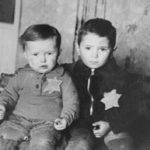
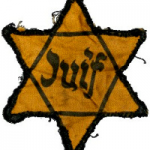 meant. Of course, the Jewish people hated the badge for what it symbolized, even though the Star of David had stood for the Jewish people since about the 12th century. While the Star of David, known as the Magen David, has continued to be the unofficial symbol of the Jewish people, even on their flag, the Menorah continues to be the official symbol of Judaism (The Jewish people). It seems to me that they would not really want the Star of David after all of the persecution that has been associated with it, but I guess it could be looked at as a badge of honor, as they, as a people survived the persecution.
meant. Of course, the Jewish people hated the badge for what it symbolized, even though the Star of David had stood for the Jewish people since about the 12th century. While the Star of David, known as the Magen David, has continued to be the unofficial symbol of the Jewish people, even on their flag, the Menorah continues to be the official symbol of Judaism (The Jewish people). It seems to me that they would not really want the Star of David after all of the persecution that has been associated with it, but I guess it could be looked at as a badge of honor, as they, as a people survived the persecution.
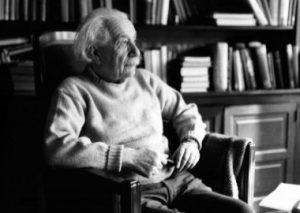 For many years, I have admired Albert Einstein. His mind and his level of intelligence intrigued me, as did his quirkiness. When you think of a genius, your mind automatically produces a picture of a very organized person, who is able to handle any situation, but even geniuses have their issues with things. One well know “weakness” for Einstein was the fact that if something can be written down, it need not take up space in his brain. His brain was very full after all, and clutter was always an issue. That said, if he couldn’t find his train ticket…for the train he took every day from home to work and back…he didn’t know at which stop to get off, because he relied on his ticket to tell him that. I don’t think most of us could even begin to filter our brain in such a way…but Einstein could, and did.
For many years, I have admired Albert Einstein. His mind and his level of intelligence intrigued me, as did his quirkiness. When you think of a genius, your mind automatically produces a picture of a very organized person, who is able to handle any situation, but even geniuses have their issues with things. One well know “weakness” for Einstein was the fact that if something can be written down, it need not take up space in his brain. His brain was very full after all, and clutter was always an issue. That said, if he couldn’t find his train ticket…for the train he took every day from home to work and back…he didn’t know at which stop to get off, because he relied on his ticket to tell him that. I don’t think most of us could even begin to filter our brain in such a way…but Einstein could, and did.
Einstein was a gifted scientist and mathematician. He was most famous for his theory of relativity and the resulting formula relating mass and energy…E = MC². He was the winner of 1921 Nobel Prize in physics for his work on the photoelectric effect, which is also known as the Hertz effect. Einstein was born in Ulm, in the Kingdom of Württemberg in the German Empire, on March 14, 1879. His parents were Hermann Einstein, a salesman and engineer, and Pauline Koch. He didn’t feel the need to celebrate his birthday,saying “It is a known fact that I was born, and that is all that is necessary.” Friends, colleagues and complete strangers still felt the need to send telegrams, cards, letters, gifts, and an elaborate birthday cake.
Being a Jewish man, circumstances in Germany became life threatening for Einstein in the early 1930s, so early in 1933, while on a trip to the United States, he knew he could not go home again, so he moved permanently  to the United States, and worked at Princeton University…a career that would take him to the end of his life on April 18, 1955. Einstein could have been saved, but when he was asked if he wanted to undergo surgery, he refused, saying, “I want to go when I want to go. It is tasteless to prolong life artificially. I have done my share; it is time to go. I will do it elegantly.” After an autopsy, Einstein’s body was cremated and his ashes spread in an undisclosed location.
to the United States, and worked at Princeton University…a career that would take him to the end of his life on April 18, 1955. Einstein could have been saved, but when he was asked if he wanted to undergo surgery, he refused, saying, “I want to go when I want to go. It is tasteless to prolong life artificially. I have done my share; it is time to go. I will do it elegantly.” After an autopsy, Einstein’s body was cremated and his ashes spread in an undisclosed location.
After his passing, another of the multiple quirky aspects of Einstein’s personality came to light when LIFE magazine wrote about a famous picture taken in Albert Einstein’s Princeton office. Einstein’s desk was just as he left it. Here, the picture says, is where Einstein worked, dreamed, lived his singular, principled life to its fullest. “When I was young, all I wanted and expected from life was to sit quietly in some corner doing my work without the public paying attention to me,” said Einstein after being honored at a social function. “And now see what has become of me.”
When I look and Einstein’s desk, it takes me back to the many times my own desk has looked exactly like that. It is another way that the famed scientific and mathematical genius and I are alike. Now, I do not claim to have the IQ of this man, but we do have a few things in common, and the ability to work on top of a stack of papers seems to be one of them. Maybe that and the ability to somewhat filter things out of my mind if they are stored in my phone which could be the same thing as filtering because I have it written down. And because of my shy side, I suppose I can understand his concern over public attention, and yet knowing that sometimes it can’t be helped. When I look at his desk, I can see a man whose mind was fill with many thoughts, making it easy to 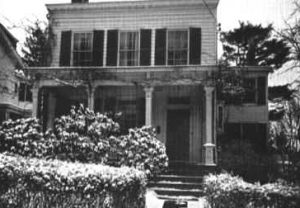 lose himself in his thoughts to the point of seeming to ignore those around him. Those who met Einstein recalled his human side. He “walked to work or rode the bus in bad weather; visited the neighbors’ newborn kittens; greeted carolers on winter nights; refused to update his eyeglass prescription; and declined to wear socks because they would get holes in them. But he didn’t seem to mind fuzzy slippers!” He was his own man with his own ideas, and if those ideas didn’t make sense to those around him, it was simply not his problem. On April 18, 1955, Albert Einstein died soon after a blood vessel burst near his heart. The world mourned Einstein’s death, but true to form, at his request, his office and house were not turned into memorials.
lose himself in his thoughts to the point of seeming to ignore those around him. Those who met Einstein recalled his human side. He “walked to work or rode the bus in bad weather; visited the neighbors’ newborn kittens; greeted carolers on winter nights; refused to update his eyeglass prescription; and declined to wear socks because they would get holes in them. But he didn’t seem to mind fuzzy slippers!” He was his own man with his own ideas, and if those ideas didn’t make sense to those around him, it was simply not his problem. On April 18, 1955, Albert Einstein died soon after a blood vessel burst near his heart. The world mourned Einstein’s death, but true to form, at his request, his office and house were not turned into memorials.
 On April 11, 1945, the American Third Army liberated the Buchenwald concentration camp, near Weimar, Germany. Buchenwald was a camp that will be judged second only to Auschwitz in the horrors it imposed on its prisoners, but on this day in 1945, those horrors came to an end. The camp held thousands of prisoners, mostly slave laborers, many of whom were required to work 15 hour days. There were no gas chambers at Buchenwald, but hundreds, and sometimes thousands of prisoners, died every month from disease, malnutrition, beatings, and executions. Doctors performed medical experiments on inmates, testing the effects of viral infections and vaccines. Beginning in 1941, a number of physicians and scientists carried out a varied program of medical experimentation on prisoners at Buchenwald in special barracks in the northern part of the main camp. Medical experiments aimed at testing the efficacy of vaccines and treatments against contagious diseases such as typhus, typhoid, cholera, and diphtheria resulted in hundreds of deaths. The people these doctors were experimenting on were considered, non-human, and so their lives, or the loss thereof, were of little or no consequence to these evil doctors and scientists.
On April 11, 1945, the American Third Army liberated the Buchenwald concentration camp, near Weimar, Germany. Buchenwald was a camp that will be judged second only to Auschwitz in the horrors it imposed on its prisoners, but on this day in 1945, those horrors came to an end. The camp held thousands of prisoners, mostly slave laborers, many of whom were required to work 15 hour days. There were no gas chambers at Buchenwald, but hundreds, and sometimes thousands of prisoners, died every month from disease, malnutrition, beatings, and executions. Doctors performed medical experiments on inmates, testing the effects of viral infections and vaccines. Beginning in 1941, a number of physicians and scientists carried out a varied program of medical experimentation on prisoners at Buchenwald in special barracks in the northern part of the main camp. Medical experiments aimed at testing the efficacy of vaccines and treatments against contagious diseases such as typhus, typhoid, cholera, and diphtheria resulted in hundreds of deaths. The people these doctors were experimenting on were considered, non-human, and so their lives, or the loss thereof, were of little or no consequence to these evil doctors and scientists.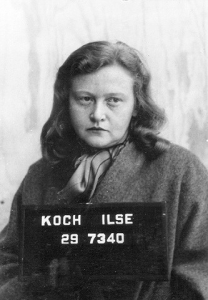
Among the camp’s most gruesome characters was Ilse Koch, wife of the camp commandant, who was infamous for her sadism. Her cruelty and heinous acts earned her the nickname, The Witch of Buchenwald. She often beat prisoners with a riding crop, and collected lampshades, book covers, and gloves made from the skin of camp victims. She was always in attendance when new prisoners were brought in. She required that they be stripped so she could examine their skin. When she found something she liked, the prisoner was killed and their skin removed for her to use. Koch was truly an evil person, and in the end, I think it all came back to haunt her, because after she was tried for a second time and given a life sentence she hanged herself at Aichach women’s prison on September 1, 1967. She was 60 years old. She was said to suffer from delusions and had become convinced that concentration camp survivors would abuse her in her cell. I think her evil ways drove her insane.
As American forces closed in on the Nazi concentration camp at Buchenwald, on April 11, 1945, Gestapo headquarters at Weimar telephoned the camp administration to announce that it was sending explosives to blow up any evidence of the camp…including its inmates. What the Gestapo did not know was that the camp administrators had already fled in fear of the Allies. A prisoner answered the phone and informed headquarters 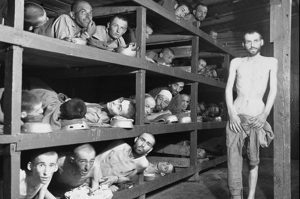 that explosives would not be needed, as the camp had already been blown up, which, of course, was not true. That act of quick thinking, saved countless lives. The sights the Allied troops saw as they entered the camps must have been sickening. People emaciated due to starvation, the smell of death everywhere, the signs of the horrific experiments that took place there. This place should never have been allowed to exist, and yet here it was. The prisoners who had managed to survive were most likely staring in stunned disbelief, not quite able to believe their eyes. Nevertheless, they had survived and they were liberated. Among those saved by the Americans was Elie Wiesel, who would go on to win the Nobel Peace Prize in 1986.
that explosives would not be needed, as the camp had already been blown up, which, of course, was not true. That act of quick thinking, saved countless lives. The sights the Allied troops saw as they entered the camps must have been sickening. People emaciated due to starvation, the smell of death everywhere, the signs of the horrific experiments that took place there. This place should never have been allowed to exist, and yet here it was. The prisoners who had managed to survive were most likely staring in stunned disbelief, not quite able to believe their eyes. Nevertheless, they had survived and they were liberated. Among those saved by the Americans was Elie Wiesel, who would go on to win the Nobel Peace Prize in 1986.
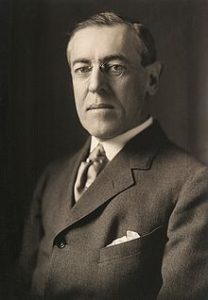 The United States has tried to stay out of most of the wars the rest of the world has become involved in, but sometimes circumstances have drawn us into wars we didn’t want to enter. World War I is a prime example of just such a situation. On February 26, 1917, President Woodrow Wilson learns of the so-called Zimmermann Telegram. The telegram was a message from German Foreign Secretary Arthur Zimmermann to the German ambassador to Mexico proposing a Mexican-German alliance in the event of a war between the United States and Germany. This telegram was a crucial step toward the entry of the United States into World War I.
The United States has tried to stay out of most of the wars the rest of the world has become involved in, but sometimes circumstances have drawn us into wars we didn’t want to enter. World War I is a prime example of just such a situation. On February 26, 1917, President Woodrow Wilson learns of the so-called Zimmermann Telegram. The telegram was a message from German Foreign Secretary Arthur Zimmermann to the German ambassador to Mexico proposing a Mexican-German alliance in the event of a war between the United States and Germany. This telegram was a crucial step toward the entry of the United States into World War I.
On February 24, 1917, British authorities gave Walter Hines Page, the United States ambassador to Britain, a copy of the Zimmermann Telegram. It was a coded message from Zimmermann to Count Johann von Bernstorff, the German ambassador to Mexico. 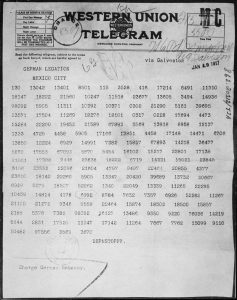 In the telegram, which was intercepted and deciphered by British intelligence in late January, Zimmermann instructed his ambassador, that in the event of a German war with the United States, to offer significant financial aid to Mexico, provided Mexico agreed to enter the conflict as a German ally. Germany also promised to restore to Mexico the lost territories of Texas, New Mexico and Arizona. Now, when you think about it, that is some big promises for Germany to be making, but I supposed that if the event of a loss in the war, all promises were null and void.
In the telegram, which was intercepted and deciphered by British intelligence in late January, Zimmermann instructed his ambassador, that in the event of a German war with the United States, to offer significant financial aid to Mexico, provided Mexico agreed to enter the conflict as a German ally. Germany also promised to restore to Mexico the lost territories of Texas, New Mexico and Arizona. Now, when you think about it, that is some big promises for Germany to be making, but I supposed that if the event of a loss in the war, all promises were null and void.
Upon learning about the proposed agreement between Germany and Mexico, the State Department was quick to send a copy of the Zimmermann Telegram to 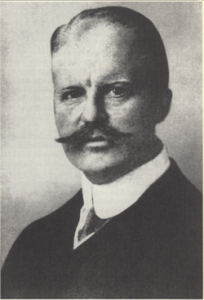 President Wilson. The president was shocked by the note’s content and the next day proposed to Congress that the United States should start arming its ships against possible German attacks. Wilson also authorized the State Department to publish the telegram. It appeared on the front pages of American newspapers on March 1, and it left many Americans horrified. The telegram was quickly declared a forgery by the public, but two days later, Zimmermann himself announced that it was genuine.
President Wilson. The president was shocked by the note’s content and the next day proposed to Congress that the United States should start arming its ships against possible German attacks. Wilson also authorized the State Department to publish the telegram. It appeared on the front pages of American newspapers on March 1, and it left many Americans horrified. The telegram was quickly declared a forgery by the public, but two days later, Zimmermann himself announced that it was genuine.
The Zimmermann Telegram helped turn the American public, already angered by repeated German attacks on United States ships, firmly against Germany. On April 2, President Wilson, who had initially sought a peaceful resolution to World War I, urged immediate United States entrance into the war. Four days later, Congress declared war against Germany, and the United States entered World War I on April 6, 1917.
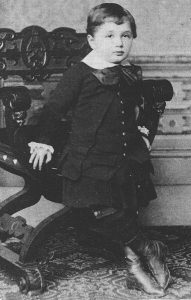 Albert Einstein has always been one of my favorite historic figures, so I decided to look for more information on him. I was surprised about some of the things I found out. Albert Einstein was born in Ulm, Germany in 1879, to parents Hermann Einstein and Pauline Einstein. Albert had a large head at the time he was born, so large, in fact that it startled his mother and grandmother when they saw him for the first time. The “fat” head slowly receded and turned into a normal size. Strangely, the head containing the brain of an amazing historic genius, was not so perfect at birth. Einstein did not speak until the age of three, odd for a genius. He revealed this fact about himself in his biography. Today there is a term, “Einstein Syndrome,” which was coined by Dr. Thomas Sowell, to describe exceptionally bright people whose speech is delayed. Einstein spent his teenage years in Munich, where his family operated an electrical equipment business. Galileo Galilei was Einstein’s favorite scientist.
Albert Einstein has always been one of my favorite historic figures, so I decided to look for more information on him. I was surprised about some of the things I found out. Albert Einstein was born in Ulm, Germany in 1879, to parents Hermann Einstein and Pauline Einstein. Albert had a large head at the time he was born, so large, in fact that it startled his mother and grandmother when they saw him for the first time. The “fat” head slowly receded and turned into a normal size. Strangely, the head containing the brain of an amazing historic genius, was not so perfect at birth. Einstein did not speak until the age of three, odd for a genius. He revealed this fact about himself in his biography. Today there is a term, “Einstein Syndrome,” which was coined by Dr. Thomas Sowell, to describe exceptionally bright people whose speech is delayed. Einstein spent his teenage years in Munich, where his family operated an electrical equipment business. Galileo Galilei was Einstein’s favorite scientist.
Albert Einstein’s lifelong love of science and math is no big secret, and in fact is what made him famous, that and his well know genius. That said, I was stunned to find out that his teachers did not 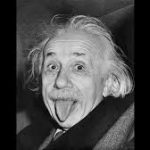 consider him a good student, and they refused to recommend him for further employment. It is said that at 16, Einstein failed an exam that would have allowed him train to become an electrical engineer. One of the things I found to be the most interesting is that Albert Einstein had a poor memory. He could not remember names, dates or phone numbers. I heard that he didn’t see the need to remember what he could have written down. Maybe this was why it needed to be written down. Most people know that he was given the Nobel Prize in 1921. It was the Nobel Prize in Physics that was awarded to Albert Einstein “for his services to Theoretical Physics, and especially for his discovery of the law of the photoelectric effect.” But, Einstein had a funny side too, and would have fit right in with the kids of today…at least in his picture taking. I really it wasn’t a selfie, but as selfies go, it fit right in with that the kids of today are doing, and apparently he though it was just as funny as they do. He was sure pleased with this one.
consider him a good student, and they refused to recommend him for further employment. It is said that at 16, Einstein failed an exam that would have allowed him train to become an electrical engineer. One of the things I found to be the most interesting is that Albert Einstein had a poor memory. He could not remember names, dates or phone numbers. I heard that he didn’t see the need to remember what he could have written down. Maybe this was why it needed to be written down. Most people know that he was given the Nobel Prize in 1921. It was the Nobel Prize in Physics that was awarded to Albert Einstein “for his services to Theoretical Physics, and especially for his discovery of the law of the photoelectric effect.” But, Einstein had a funny side too, and would have fit right in with the kids of today…at least in his picture taking. I really it wasn’t a selfie, but as selfies go, it fit right in with that the kids of today are doing, and apparently he though it was just as funny as they do. He was sure pleased with this one.
One of the most interesting things I found out was that Einstein was offered the opportunity to become 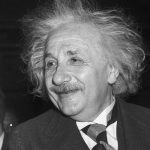 president of Israel after the its first president died in 1952. Einstein politely refused the offer, saying that he did not have the natural aptitude and experience to deal with people properly. He said that he could only understand a little of science and none of human nature. A little of science!!! Really!! I suppose that a genius would know and realize that just like the Bible, our understanding of science has only scratched the surface. Sadly, Albert Einstein had a “practical” view, if you will, of human life. He could have lived longer than he did. But, before he died, doctors suggested surgery to Einstein, because he suffered from a burst blood vessel. However, Einstein refused, stating, “It is tasteless to prolong life artificially.” I don’t understand why he ended such brilliance by refusing an operation that could save him. I find that very sad.
president of Israel after the its first president died in 1952. Einstein politely refused the offer, saying that he did not have the natural aptitude and experience to deal with people properly. He said that he could only understand a little of science and none of human nature. A little of science!!! Really!! I suppose that a genius would know and realize that just like the Bible, our understanding of science has only scratched the surface. Sadly, Albert Einstein had a “practical” view, if you will, of human life. He could have lived longer than he did. But, before he died, doctors suggested surgery to Einstein, because he suffered from a burst blood vessel. However, Einstein refused, stating, “It is tasteless to prolong life artificially.” I don’t understand why he ended such brilliance by refusing an operation that could save him. I find that very sad.

